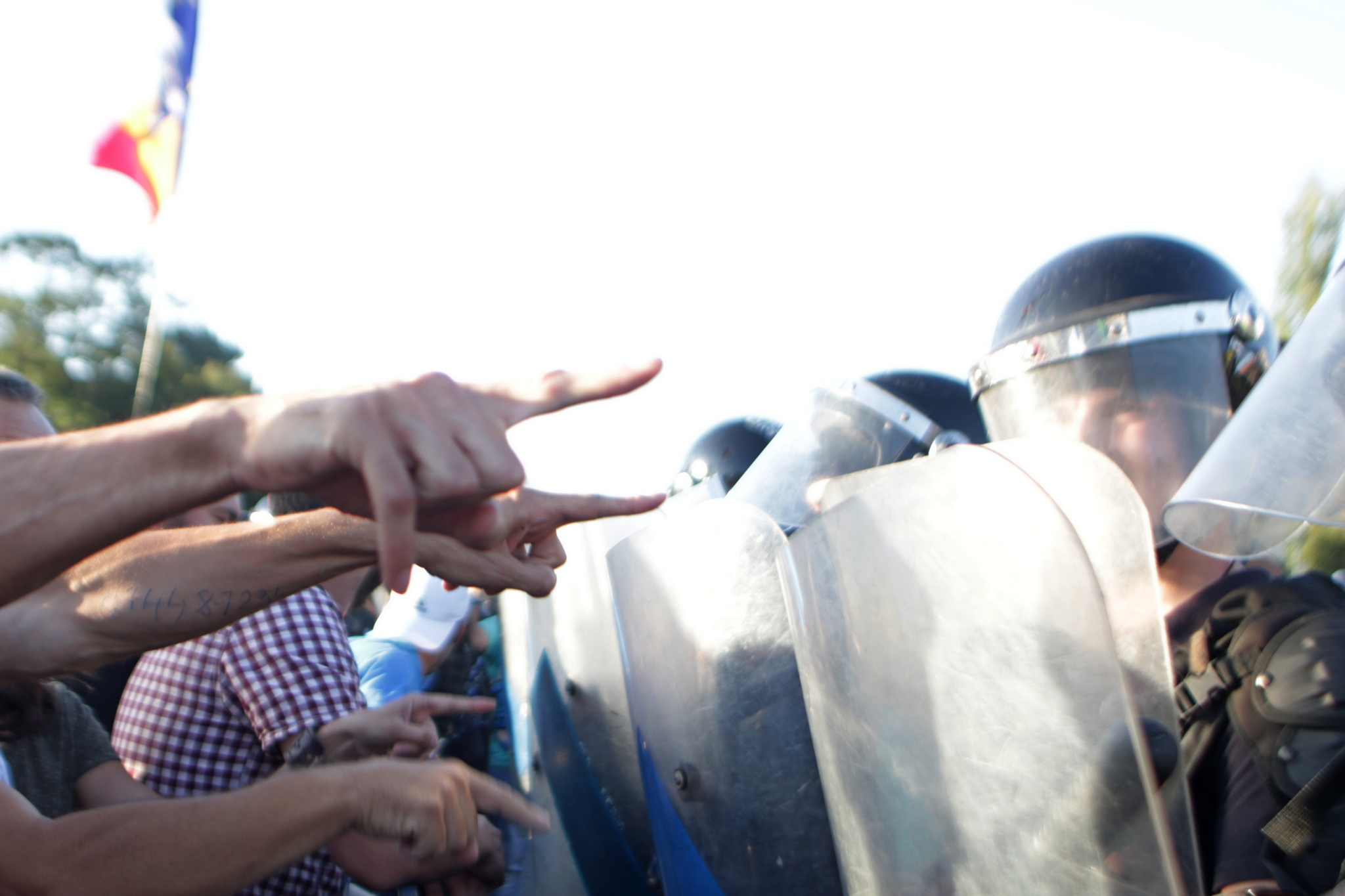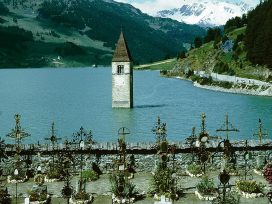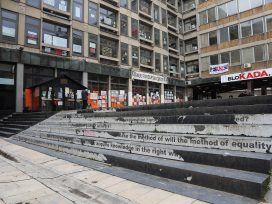On 10 August 2018, tens of thousands of Romanians from the European migration, joined by other Romanian citizens, descended onto the streets of Bucharest in order to protest against the government. They were met with tear gas. The gendarmerie brutally charged at the crowd, beating people up and dispersing them with water cannons. The police later claimed that their violence was legitimate against provocateurs. However, as multiple testimonies showed, violent protesters were not encircled and isolated from the crowd but, on the contrary, used to legitimize the indiscriminate use of force. Nothing was done to protect the peaceful protesters. Instead, they were considered potential adversaries from the very beginning. Hundreds were injured. The president condemned police brutality and the military prosecution opened an investigation. Yet so far no member of government has apologized for the misdeeds of the gendarmerie. The authorities claim to have been defending the state. Prime minister Viorica Dancilă even sent a letter to the president of the European commission, Jean-Claude Juncker, stating that the protests were an attempt to overthrow a legitimate government.
The 10 August protests differed from other anti-corruption protests of the past two years due, on one hand, to the participation of the Romanian diaspora and, on the other, to the violence deployed by the police. There is no study about the social composition of the participants who returned to Romania for this event, but one can surmise that the protest definitely wasn’t exclusively (or even predominantly) a middle class one, which has been the usual criticism of anti-corruption protests. In fact, it was the most heterogeneous crowd ever to have gathered at Victory Square in Bucharest: people working in NGOs abroad, students who have left to study, construction workers and engineers turned drivers. They shared the belief that they had a mandate to criticize a political system that forced them to leave. The current government is widely considered the worst one since the ’89 transition and it is represented by a party usually associated with graft, incompetence, clientelistic and manipulative practices inherited from before ’89.

Bucharest anti-corruption protest of the Romanian diaspora, 10 August 2018. Photo source: Cristian Iohan Ştefănescu via Flickr
The Swedish license plates
The language of the event was significantly influenced by a particular slogan, inspired by a Romanian worker who lives in Sweden. On 31 July 2018, the Bucharest police confiscated the man’s personalized license plates composed of seven letters: ‘MUIE PSD’ (‘Suck it, PSD’). The message had already been traveling for a week from the north of the country to Bucharest, and had become viral on social networks. The Romanian police opened a file against the man by invoking a convention that had not been in use since 2016. This turned the seven-letter message from a burlesque slander into a political cry. It ceased to be merely a subversively wink and became a call to unite against the government. The seven letters provided a simple and effective written code spanning different social categories, and a palpable proof and symbol of the authoritarian nature of a government that abusively detained a free citizen.
The outrage was moulded upon a familiar experience of indictments for petty disobedience back in the days of communism and was directed at a power that confirmed the suspicion that it had not abandoned its dictatorial reflexes. What is particular about the current regime in Romania, in comparison with other governments, is a certain type of authoritarian, spiteful – sometimes vulgar – and manipulative style. This has been proven many times in parliament, where representatives of the ruling party have addressed women from the opposition in a vulgar way. By being sensitive about this type of political slander and by being blind to other types of contestation, the ruling party has proven that verbal aggression (and not the argument) really was effective in their discursive realm.
It was common knowledge that the Ministry of Interior, Carmen Dan, was a former secretary of Liviu Dragnea, the leader of the governing PSD party. One can surmise that she was given a direct order to suppress the license plate. This disproportionate use of illegitimate force against an expatriate signalled that the government was no longer masking its abuses through legislation but now openly revealing its power and its clientelism.
Outcry
The insult on the license plate became the chorus of the protests. The spiral of political violence influenced the emergence of the slogan. Yet, some leftist intellectuals have instead deplored the baseness of the protesters’ political imaginary. Alina Mungiu-Pippidi even used the prefix ‘lumpen’ with regard to the expatriates, turning the denunciatory message against the messenger itself. Other interpretations predictably interpreted the vulgarity of the slogan as a sign of insubstantiality. If the central message of the protests – anti-corruption – was seen as to condone the neoliberal vulgate of anti-communism, this particular slogan confirmed the flimsiness of the revolt and, implicitly, of its stakes. Some argued that the protest had no strong and unifying ideology, only contempt. According to one commentator, people would prove more ideologically divided about the issue of the basic income than about their desire to simply dismiss the regime.
These Romanian protests are desperate mobilizations against a government that has proven not only that it can disguise neoliberal policy as welfare policy but, more importantly, that it can dismantle the judiciary and other state institutions for the sake of individual politicians. The institutions that can still convey justice, defend workers, and guarantee fair redistribution are being dismantled. This drove expatriates to come and protest from thousands of kilometres away: the concern for their loved ones and their livelihood in a country where the government offers amnesty for corrupt politicians, while ignoring healthcare or educational reform.
Labelling protests as ‘vague’ is a gross misunderstanding not only of the recent protests, but of the very idea of civic revolt. Spontaneous street action is not about articulated political programs, nor about constructive rhetoric. The apparent flimsiness of a slanderous slogan is not about groping political ideas, it is about anger over deeply anti-democratic politics, the spiteful break of a social contract by power itself, and the protesters’ rejection of these. The political views of different factions within a crowd have often indeed proven irreconcilable, yet this does not invalidate the motor behind the protests. Lack of coherence in details does not stand for lack of substance. It actually substantiates the political claims of a crowd, which mobilized in spite of particular divergences. The assault on democracy in Romania is so dramatic that it triggered a response breaching social and conceptual boundaries.
Purity
The ‘meeting of the diaspora’ had to do with the sacking of Laura Codruța Kövesi, the head of the Anti-Corruption Prosecutor’s Office (DNA) a month earlier. Hundreds of politicians were indicted with Kövesi at the helm of DNA. The controversial dismissal of Kövesi was the result of an unsubstantiated report by the Ministry of Justice claiming, among other things, not objective misdeeds, but rather reproducing media perceptions of a number of anti-corruption trials. It confirmed the fears of those who had been protesting the ‘judicial reform’. It was now clear that the judiciary was not going to be reformed for the better, but weakened, in order to end the investigation of politicians. Seeing the rule of law crumbling like this, expatriates were motivated to turn their ritual summertime visits for vacation into a political pilgrimage.
The idea to launch a socio-political charivari most probably crystallized some time after June 2018, when the governing Social Democratic Party organized its own rally to counter the spontaneous anti-government protests of the past year and a half. Demonstrators were more likely to have been transported to this pro-government rally than to have turned up on their own will: the trips were paid by local administrations, affiliated with the governing party and members of the local clientele. People were asked to come dressed in white, as a symbol of ‘purity’, also as a response to the #resist movement, which usually labels the party in power as the ‘red plague’. During the rally, Dragnea reiterated his usual accusations against the ‘parallel state’, which he understands as an alliance between the secret services and the judiciary. The whiteness of the crowd was invoked not only as a symbol of the ‘purity of the people’ but also, in a weird association, as the cleanliness they were supposed to insure after purging the country of ‘rats’ – meaning the judiciary and those opposing power. It is no wonder that these remarks re-ignited political passions, this time involving migrants. They travelled thousands of kilometres from Spain and Italy in order to defend democracy and the rule of law at their own expense.
Justice
In Romania, the number of crimes related to the abuse of office has increased in the last years. As a result, the current parliamentary majority changed the penal code in July 2018, effectively decriminalizing it. With these changes, the abuse of office is no longer a crime unless the prosecutors can prove that the accused committed the crime for their own benefit or for that of close relatives. Two things are striking about the measure. First, the change serves the current leader of the ruling party, Liviu Dragnea, who was found guilty by the Supreme Court and sentenced to prison because two women were on the payroll of a state agency in 2006–2013 while also working for his party while he was a county council chief. This connection was not hard to make. Second and more covertly, the government is passing laws that turn a blind eye to white collar crimes; if they are not prosecuted, the crimes don’t exist. When a government is unwilling or incapable of undertaking comprehensive reforms, it is prepared to manipulate figures by redefining the variables. In Romania the immediate goal of the ‘reforms’ is the reversal of sentence for Liviu Dragnea and his political clientele. More broadly, it is a matter of forging data and creating new perceptions.
This was not the first attempt of the current ruling party to subordinate the judiciary and to put the country back to a time before the legal reform of 2005. In February 2017, hundreds of thousands Romanians protested against the ruling party’s intention to decriminalize abuse of office through an infamous emergency decree adopted at night in a secret governmental meeting. Protesters displayed ‘hands-off DNA’ on their placards. The decree was repealed, but the same decriminalization was introduced through a longer procedure in parliament. The changes to the penal code were rapidly adopted on 18 June 2018. Hundreds of pages including modifications were voted on within an hour, without proper debate. The microphone of the opposition was silenced and procedure was not respected. The abuses were motivated by ‘the emergency to stop abuses’.
Other worrying modifications were also voted for. The Prosecutors’ Association of Romania explained these in a public document: crimes are not prosecuted if enough evidence is not gathered within one year. A third person’s recording of a crime does not constitute evidence, nor do films made by public cameras; witnesses’ testimonies are not relevant. In other words: if a girl is raped in the park and another person has recorded the event, the latter’s evidence is not admitted. The victim has to record the rape in order for the recording to be accepted as evidence. Furthermore, suspects must be informed about an ongoing investigation: a demand that goes against the logic of investigation and a gross misinterpretation of a suspect’s human rights.
In an interview on 19 April 2018, prosecutor Bogdan Gabor, chief of the Prosecutors’ Association, warned of further distressing issues: restraining non-classified information would make it impossible to have access to public acquisitions (a notorious field of rampant corruption); ‘organized crime’ would be more difficult to indict because of the modification of the concept itself; false testimonies would not be indicted if the witness claims ‘memory loss’. Furthermore, negligence at the workplace would no longer constitute a crime. Those convicted of negligence in connection with the fire that killed dozens of people at ‘Colectiv Club’ in Bucharest in 2015 would be exempted from guilt.
In the modifications, victims are protected more than perpetrators and, less obviously, organized crime becomes more difficult to prove. The modifications are either explicit in reducing sentences and intervals of investigations, or formulated so as to prolong and thus deter the course of justice. And justice is deterred exactly in cases in which clientelism and incompetence, influence and business with the state are involved. The new law resembles the carefully crafted product of a mastermind, at odds with the chaotic governance in other fields. The ruling parliamentary majority voted for all the modifications as soon as possible and was uninterested in the political debate over changes to such an important law. As a last piece of a puzzle, the chief of the DNA was revoked, just as the protesters had feared a year and a half ago.
No illusions
Is the protesters’ fight against ‘scroungers’ thus an illusory one? After sacking the chief of the Anti-Corruption Prosecutor’s Office, the Ministry of Justice accused prosecutors from within the Public Ministry that they were ‘deviating from a constitutional path’. The target is now the General Prosecutor, after the Justice Ministry was criticized in a letter signed by 181 magistrates.
Although Romania took over the presidency of the European Council at the beginning of 2019, the Ministry of Justice announced that he was not giving up the plan to remove the General Prosecutor. Gaining more European exposure, the president Iohannis said he would not approve this revocation because there are no well-founded reasons for it. Meanwhile, Dragnea, the de facto leader of the government, has proven unable to pass the amnesty decree announced in late 2018 that was supposed to protect him and his political clientele. He thus chose to procedurally contest the very judicial bodies that convicted him of abuse of office, and even contest the investigation conducted by the OLAF, the European Commission anti-fraud body, which concluded that 20 million euros of EU funds had been illegally appropriated by the Tel Drum company for road works. It is no wonder that Dragnea did not take part in the official ceremony for the start of Romania’s presidency of the European Council at the Athenaeum in Bucharest.
Politically motivated measures combined with irresponsible economic planning and the administrative dependence of local government have already gravely affected local economies, public health, the high and low-level management of funds, and institutional functioning. Investments have been blocked due to unsustainable electoral promises which had emptied the state budget. Prosecutors are again under political pressure from a newly created organ allegedly intended to address prosecutors’ mistakes, thus ignoring a judicial tradition of correcting errors through institutional appeals, rather than indictment of persons. In small cities, prosecutors’ offices have disappeared altogether because of austerity measures that constrain those commuting or doing supplementary hours. People living in small cities suffer not only from rampant petty crime, but also from lack of medical care, since medical supplementary hours are no longer paid.
It is ridiculous to condemn the protesters for not addressing proper labour-related issues, or to dismiss their anger as exacerbated political perception, when they are confronting such a huge cluster of dangerous policies, arrogant communication and regime propaganda. Cynicism about the ‘fight for democracy’ has already infiltrated the Romanian discourse, as a sort of malaise of both the young and the older intelligentsia. It is vital that Romanian critical intellectuals re-animate democratic ideals and assess real problems, for which truthful accounts can still be given.







